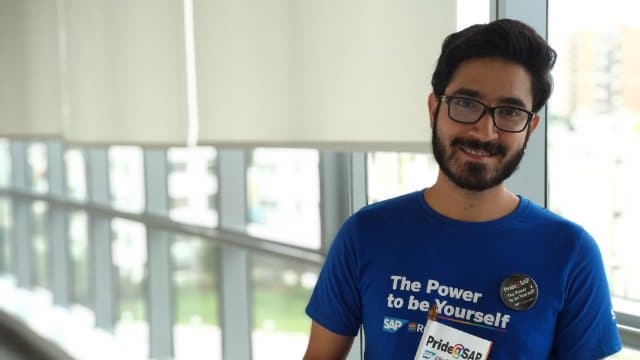At SAP, we believe that when you bring everything you are, you can become everything you want.
Imagine an equilateral triangle that rotates slowly and perpetually, on a fixed axis. The rotation ensures that the apex, or highest relative point of the triangle, keeps changing. The three intersecting points, each of equal value at precisely sixty degrees, are marked with a single word. The first is ‘belief’, the second is ‘honesty’ and the third is ‘liberation’.
That’s probably the best way to describe the way Sameer Ranjan Kumar sees all three words and how they are not just interlinked but interdependent as well.
“Belief, honesty and liberation are all equally important to me,” he says, “because I identify myself as a gay man and I am out about it in my workplace.

Sameer Ranjan Kumar, Developer, C4C Engineering, SAP
“There are many levels of discussion in terms of why SAP is such a great place. According to me, what is regarded as the most important aspect is definitely how great this company is from a purely technological point of view. I’m sure most of my colleagues would agree with that. But in my case, what is even more important is the diversity and inclusion aspect of this company. For me, that’s where SAP has played a really major role. Even before I came out to the entire organization, my manager was the first person I had come out to.
“I thought it would be a difficult conversation and I knew it would take a lot of courage – on both sides of the table. In part, this was because of the conservative mindset that we have in India, the law that prevailed at the time, and the nature of society too. Also, you must bear in mind that this was before the 377 verdict – so homosexuality was still a crime. (Editor’s note: a colonial-era law widely known as ‘Section 377’ in India categorized gay sex as a criminal offence that was punishable by a ten-year jail term. An appeal in 2013 upheld its validity, but in early September 2018, India’s Supreme Court overturned the law, while ruling that discrimination on the basis of sexual orientation is a fundamental violation of human rights.)
“Before that historic ruling, there was always quite literally a fear of being put behind bars. Or a fear of somebody misusing that information about me, because there were so many cases of people being blackmailed for it. In that sort of environment, when you’re closeted, you’re not closeting it just from the government or from the authorities or from the organization that you work for; you’re closeting it from your family members, from your friends, from your landlord, to just about everybody around you in your everyday life. So it’s a big thing that you’re cloaking. And plus that entire phase, through your entire childhood, your puberty, your adolescence, you develop a kind of an instinct whereby you become overprotective of the truth. Essentially, that survival instinct changes you in a very negative way because you cannot be yourself.
“It did take a toll on me, I’ll be very honest about it. Even now, I won’t say that I’m 100 per cent over it; there are times when I need medicines. For me, I was dealing with two issues, not just one – you have to remember that in India, apart from talking about homosexuality, talking about mental health is another taboo. I couldn’t just say, I’m stressed out but it’s okay, I’ll just grab a beer and I should be done. That’s not it. It’s not something as trivial as that. Had it been that trivial, then a person would not require pills basically to survive. I was going through depression and anxiety.”
When Sameer says “depression”, does he mean he was momentarily depressed, or is he referring to a state of clinical depression? Aware of the distinction between the two, he says he was “almost on the borderline”.
He says it was taking a heavy toll on his everyday life. “The point is, I was living a dual life because I had to fake so much. Even on social media, if I happened to post a picture with a woman, the default instinct is that people would ask, is that your girlfriend? And I’m thinking like, okay, that’s impossible, but of course I can’t say that! Or if I’ve gone on a trip with my partner, how do I post? Or if I had a romantic picture of both of us that I wanted to display on my desk, I wasn’t able to do it back then. Because in India, it’s still a very uncommon sight.
“Now that I’m out at work, I do have my partner’s picture – our picture – on my desk. And nobody questions it. I have a rainbow flag as well and I think my sexuality is pretty much obvious now. I wrote a blog and shared it with the entire organization, so most of the people already know. I think I am the only employee who is out at SAP Labs in Bangalore.”
Does Sameer see himself as a figure of courage for other people who are in the same situation? “Only now do I feel it. But when I was coming out it was really an emotionally turbulent time. At that point in time, it really doesn’t strike you that you might actually be a beacon of hope for someone else. At that juncture, it’s more to do with your own sense of liberation. And consider this, too – people who don’t belong to the community might feel, what’s the big deal about it? Many might think, okay, it’s just orientation and exactly the way I’m straight, you’re gay, so why is it a major difference? But the problem lies in the fact that straight people have not had to cloak it. They haven’t had to hide it or be secretive about it.
“Before I came out, it was something I could not discuss with anyone except with people who were also from the community. That’s why it’s a big deal. You’ve not talked about it to anyone. You’ve not even talked about it with your relatives or your cousins, you’ve not discussed it with your siblings. With nobody.
“This was something which I’d always contained within myself, hiding it from everyone. But there came a point when all this juggling, this dual life, the half-truths, all of that became too much for me. So that was when I decided to come out to my parents. You know, the marriage conversation was triggering at home, but without any real pressure. That was probably the end of 2016 or the beginning of 2017. Get married? How on earth could I do that? So I lied to them. I just said, maybe another year, maybe I want to study, or I want to focus on my career right now.
“But when I’d finally run out of excuses, they were like, we don’t want you to marry right now, but we want you to at least get into the process of seeing the girls, meeting them, whatever, to see if it clicks. Or if you don’t want an arranged marriage, then let us know if there is someone whom you love. So when all those conversations were happening, and given the kind of person I had always been, I knew I couldn’t keep lying. I was already popping pills, but I was clear in my head that I didn’t want to marry just for the sake of society and my parents.
“Honesty was a big factor for me, and it was the reason why I came out to my parents. That was my first milestone, and it was the most difficult for any boy growing up in India. I have to say that my parents have been very supportive. My mum talks to my partner, and my dad is also comfortable about it, even though he’s not very vocal in discussing it. In India we hear so many stories of parents disowning their kids, so obviously that was as big a challenge for my parents as it was for me.
“Finding the confidence to tell my SAP manager wasn’t easy, either, even though he comes across as a person who is very liberal, who doesn’t discriminate. That gave me a lot of confidence, and this was bolstered by the inclusive, enlightened culture at SAP. But there’s always one fraction of the thought – what if? What if he doesn’t take my revelation the right way? That is really where the organization comes into it. At the end of the day, a manager represents the organization, and of course your career to a very large extent depends on your manager.
“But my manager accepted it with absolute open arms. There was no change in his behavior. I was still treated in the same way he had always treated me. And because of that, I started opening up. After my manager, then I came out to my very close colleagues. Slowly in that way, the network of people who knew the truth about me began to grow. Then I joined the Ally group, and I attended the Pride March, which enabled me to come out to a few people in HR and a few people who were driving it. So in that way the circle slowly grew, but it was still only a few people.
“However, despite these positive experiences, coming out is never a single-day thing. You can’t just tick a day on your calendar and say, I’m going to tell everyone. It’s doesn’t work that way. It’s not like you suddenly wake up one morning and say, this is the day and you post on social media and it’s done.
“Before I came out at work, what I used to find very bothersome was this – if a married colleague of mine had to leave the office early, it was very easy for them to email their colleagues or their manager to say, ‘My husband or my wife is not keeping well and so I need to take a day off, or I’m going to work from home today’. Fair enough, right? But in my case, I would have to cook up an excuse to say that I had some maintenance work at home or a repair man, a plumber or a carpenter coming to my apartment. Or if it was our anniversary and my partner sent me flowers to the office, I had to say I actually didn’t know who they were from. But even if I said, ‘I didn’t know’, people would assume okay, which girl is she, who is she, and they would say, ‘Tell us!’ Having to keep up this deception felt so dishonest. But at that point of time, being authentic to myself was the biggest need. It was more pertinent than anything else; possibly that’s something that I can never explain in words, why the human psyche works that way, or why psychology functions that way.
“I’m not sure how it can be perceived by someone who’s never been through it. Many people say my sexuality is my choice, but it’s not. It’s not something I chose. Had it been my choice, I would probably, at that stage of my life, have chosen to be straight. My anxiety was slowly being converted into a lot of angst. I was becoming more of an angry and a negative person.
“Now I’m not. Now, I’m in a much, much better place. That’s how coming out makes a huge difference. I no longer felt tired and exhausted due to having my defenses up all the time. You sometimes feel, how comfortable is the life of straight people. They have full freedom to act and full freedom to choose. But on the other hand, I didn’t have the basic right to be who I am. I never expected sympathy. I just wanted to be myself, at a time when it was punishable by law.
“The progression was so important in my long search for honesty. And it was a slow process. I broached the subject with my parents in 2016. Then the conversation with my manager was in 2017, towards the end of the year. I finally came out to the entire organization with my blog post that was published on Valentine’s Day 2018.
“That’s truly where the role of the organization comes in. And that’s where I think SAP is really doing it the right way. Now probably for others in the organization who are debating whether to come out or not, it’s probably better or easier, because I guess they have an example to follow. I don’t really see myself as a role model because I’m too humble to see myself in that light. But in my case, I had no one to emulate at SAP India in this respect, so I had to brave it myself.
“In relation to coming out, the number of employees who have chosen to do so is not the yardstick to measure the level of inclusion; it’s the mindset that surrounds it. It’s all about whether you’re able to provide that ecosystem of genuine support or not. And I can say honestly and confidently that SAP ticks all these boxes.
“Immediately after my blog post was published, Shradhanjali Rao, the head of HR, called me and she offered me the opportunity to actually lead the cultural identity pillar with Vishalakshi Khizhakhe. My blog has also been shared on multiple forums and because my opinion is sought, the realization dawned on me that I really am making a difference for others. Prior to that, it was a different thing altogether, it was about my own sense of liberation from all the shackles. But now, it’s about helping others, based on my own experiences.
“This sense of gratitude is very much needed for mental well-being. From a mental health perspective, I have improved a lot because of that. Now that I don’t have to bother about hiding my sexual orientation in any way, I’m 100 per cent here for work. My productivity speaks for itself and my commitment is here for all to see. All my energy goes into my job during my working hours, because I don’t have to worry about who I am any more. Who I am, what I do, who I’m with and whether that person is a guy or a girl, it doesn’t matter now.
“SAP has played an integral role in the way I found peace with finding myself and becoming comfortable with who I am. This company was pivotal in opening this whole debate and reassuring me. I started here as a new grad in 2012. I was hired after on-campus interviews but at that time I had no idea that the company had such a far-sighted view on these issues. I guess destiny had a role in my coming here. Back then, I had no idea about their incredible commitment to D&I. When I was hired, all I knew about it was the amazing technology, the big-shot ERP stature, that this company was a global tech giant. And that’s where I think providence perhaps played a role in my coming here.
“In the workplace, if you are not given the right kind of treatment or the right level of understanding, you’ll never be able to do it in any meaningful way outside, where it is even more challenging. At SAP, you always know there is an HR lobby to take care of you. There is a Respect At Work forum where you can redress any grievance you might have, in some way. But outside – it’s a jungle out there.
“The role that SAP has played in my life is really huge, because right now I’m involved in engagement outside the office, at the Bangalore level, where there also are D&I initiatives. But the starting point for me was SAP. If I had not received the kind of acceptance that I’ve had here, in this organization or at home, indigenously, probably I would not have mustered the courage to do come out.”
This article was originally featured on SAP Careers.



